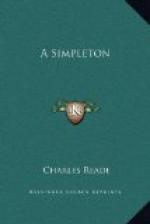Then he drew her a model of an ox-mill, and of a miner’s dormitory, the partitions six feet six apart, so that these very partitions formed the bedstead, the bed-sacking being hooked to the uprights. He drew his model for twenty bedrooms.
The portable forge and the ox-mill pleased Dick Dale most, but the partitioned bedsteads charmed Phoebe. She said, “Oh, doctor, how can one man’s head hold so many things? If there’s a man on earth I can trust my husband with, ’tis you. But if things go cross up there, promise me you will come back at once and cast in your lot with us. We have got money and stock, and you have got headpiece; we might do very well together. Indeed, indeed we might. Promise me. Oh, do, please, promise me!”
“I promise you.”
And on this understanding, Staines and Falcon were equipped with rifles, pickaxe, shovels, waterproofs, and full saddle-bags, and started, with many shakings of the hand, and many tears from Phoebe, for the diamond washings.
CHAPTER XXI.
Phoebe’s tears at parting made Staines feel uncomfortable, and he said so.
“Pooh, pooh!” said Falcon, “crying for nothing does a woman good.”
Christopher stared at him.
Falcon’s spirits rose as they proceeded. He was like a boy let loose from school. His fluency and charm of manner served, however, to cheer a singularly dreary journey.
The travellers soon entered on a vast and forbidding region, that wearied the eye; at their feet a dull, rusty carpet of dried grass and wild camomile, with pale-red sand peeping through the burnt and scanty herbage. On the low mounds, that looked like heaps of sifted ashes, struggled now and then into sickliness a ragged, twisted shrub. There were flowers too, but so sparse, that they sparkled vainly in the colorless waste, which stretched to the horizon. The farmhouses were twenty miles apart, and nine out of ten of them were new ones built by the Boers since they degenerated into white savages: mere huts, with domed kitchens behind them. In the dwelling-house the whole family pigged together, with raw flesh drying on the rafters, stinking skins in a corner, parasitical vermin of all sorts blackening the floor, and particularly a small, biting, and odoriferous tortoise, compared with which the insect a London washerwoman brings into your house in her basket, is a stroke with a feather—and all this without the excuse of penury; for many of these were shepherd kings, sheared four thousand fleeces a year, and owned a hundred horses and horned cattle.
These Boers are compelled, by unwritten law, to receive travellers and water their cattle; but our travellers, after one or two experiences, ceased to trouble them; for, added to the dirt, the men were sullen, the women moody, silent, brainless; the whole reception churlish. Staines detected in them an uneasy consciousness that they had descended, in more ways than one, from a civilized race; and the superior bearing of a European seemed to remind them what they had been, and might have been, and were not; so, after an attempt or two, our adventurers avoided the Boers, and tried the Kafirs. They found the savages socially superior, though their moral character does not rank high.




